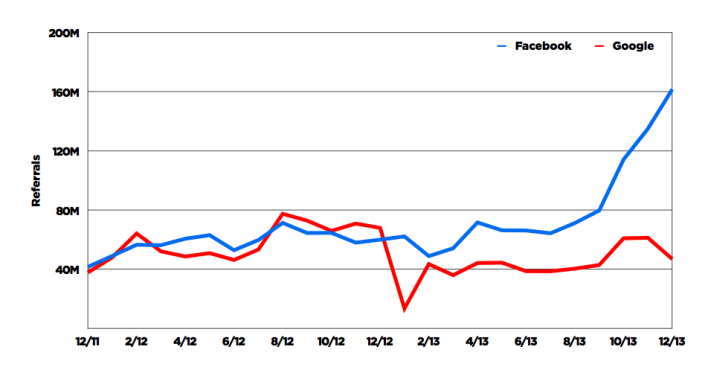A week or so ago, Buzzfeed shared the following chart that shows how traffic referrals from Facebook have spiked over the last six months while traffic from Google has remained relatively steady, dipping slightly. The usual caveats around making broad assumptions based on one use case are firmly in place here, of course.
Mathew Ingram at GigaOm has his own take on the data, including a second chart that shows which publishers are faring best in terms of content being shared on Facebook. In this case Upworthy holds a massive lead and I’m going to stop myself from using any sort of “and you won’t believe why” joke here because it’s been done to death.
As both Ingram and Kafka note, Facebook has been making a big play recently for the attention of publishers, showing off how they can make their content more successful, promoting new tools to encourage sharing and discovery and more. The launch of Facebook Paper is all about that, with mainstream news publications – including ones an individual hasn’t Liked or otherwise followed – getting the same (maybe more) emphasis in the app as a user’s network of friends.
Much of the analysis around all this data has included commentary about how it’s just as likely that at some point Facebook will tweak it’s algorithm in a way that will benefit some and hurt others in the same way Google has done over the years. But, and it may be an over-simplification of the issue, no one has really looked at how it is the most obvious thing in the world that these publications benefit more from Facebook (and Twitter to a lesser extent) while seeing only marginal results from search.
The short and simple answer is that the content that’s published on those sites is about as un-search friendly, at least in the traditional sense, as possible.
In the old days of SEO (read: 2000-2009), content optimization was about making sure there was a date structure in a post’s URL (so search would easily know it was new content and rank accordingly), that the headline and top two paragraphs were keyword-rich without crossing the line and more. You were basically writing for how you wanted people to find it. So you had to think like a searcher. If your article was about banana-shaped fish in the Pacific Ocean, you can be “banana, shaped, fish, pacific” and other keywords were going to be at or near the top of that page.
This is, in fact, an area where the “new” media was trumping the “old.” Newspaper and magazine editors continued to try to out-clever each other in their headline writing while bloggers and nascent brand publishers learned real quick what worked and what didn’t by tracking Google Analytics numbers and adjusting accordingly.
But content on Upworthy, Deadspin, Buzzfeed and others are back in the headline game since their discovery is so dependent on social sharing. They write provocative headlines that feature leading questions because yes, I do want to know why that dog wasn’t allowed in the pets-only area of the local park because that’s outrageous.
And no, that’s not something I’ve ever clicked on or thought to myself.
No one is going to search Google, Yahoo, Bing or anything else for 16 Parks and Recreation GIFs that Summarize the Sochi Olympics or similar stories. It’s highly unlikely that anyone has thought that was something that was missing from their lives. Other than that writer, of course. But it’s something a fair number of people will click on from Facebook because it’s low-calorie content and will take all of 90 seconds to consume.
Buzzfeed and it’s ilk are essentially so uninterested in search it’s kind of startling. Sure, they still get some traffic that way, but it’s not their bread and butter. And that’s almost a 180-degree flip from the old days, when the emphasis was on search while social sharing – done largely through Stumbleupon and the original version of Digg – was secondary.
For people like me who made our bones in old-school SEO (not specifically but as a subset of our skills in publishing) that means one of two things: We can either keep doing what we’ve been doing in the belief that by emphasizing long-term discoverability and value we are continuing to build a better web by not giving in to the latest cheap fad, or we can do the other thing. You can likely guess from how I’ve completely biased the two sides of the argument which side I fall on.
That’s not to say there isn’t a place – a valuable one – in listiicles, occasionally over-wrought headlines and stories that are just GIFs with the bare minimum of context. But, like that Snickers bar I’ve been craving for the last three days, it’s just one small part of the overall picture. And that’s the same advice I give my clients. My career will be decided by whether that works out long-term or not.
On a related note, Upworthy has come out and said they will moving away from page views as a measure of success and instead looking at something call “attention minutes.” They make a fair case as to why some traditional metrics don’t work in all cases and it will be interesting to see if other publishers begin to follow their lead on this in the same way they have on headline writing and so on.

I love (sarcastic) how Facebook is wooing publishers; yet what about readers? As a reader, I’m tired of Facebook’s algorithm–especially when it’s geared to favor publishers over the reader.